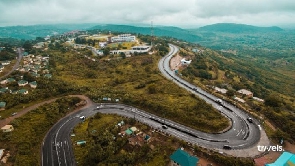- Home - News
- TWI News | TV
- Polls
- Year In Review
- News Archive
- Crime & Punishment
- Politics
- Regional
- Editorial
- Health
- Ghanaians Abroad
- Tabloid
- Africa
- Religion
- Election 2020
- Coronavirus
- News Videos | TV
- Photo Archives
- News Headlines
- Press Release
Opinions of Saturday, 19 December 2020
Columnist: Kaba Atawoge
The Sakora cry of the Aburi Hills
My first time in Aburi was in April 2018. The greeny vegetation was a beauty to behold and welcoming. The smell after Ayi Mensah was distinctive and unique to the area. There was the smell of nectar and flowers, my nose was so confused. It was green on both sides. Climbing up the meanders to Peduase felt like a train beneath the trees-formed canopy. This is a period the Ayi Mensah Park didn't exist. I remember a grasscutter crossed the road on my return ride at Ayi Bediako that got those who saw it talking all the way to Zongo Junction, Madina. In short, you were travelling through a customized Amazon.
Two years down the lane and one can spot the brown patches up the hills from Special Ice. The entire hills have been sold out to developers. They attack the virgin vegetation with no emotion so long as it is putting a few Cedi in their pocket. Incessant and reckless dynamiting of rocks to make way for apartment buildings and rest houses got huge boulders to roll up the main road in 2019 that saw the route diverted through Kwabenya.
Before this inconvenience, Pokuase, my place of residence since 2017 has been under the mercy of floodwaters. Waters that deprived me of any certificates and clothes. There are days the area gets flooded without rain because it had rained in Aburi and these waters run through Brekusu to my place. It is so because the vegetation has been depleted and the hills can no longer hold backwater. The result of this is flooding in Pokuase.
It is no longer safe and the grasscutter that crossed the road in 2017 can no longer call Ayi Bediako home. The nectar and flowers have doffed off hats to weedicides, excavators, and the mason's gauge. It is fast becoming the master sakora of hills.
Human development that does not make space for conservation is nothing but a vehicle driven by extinction. If care is not taken, posterity will have to visit a museum in 2050 to see a tree. Atewa must be protected. The Aburi Hills must be wrestled from the hands of the green vandals and keepers of the brown.











